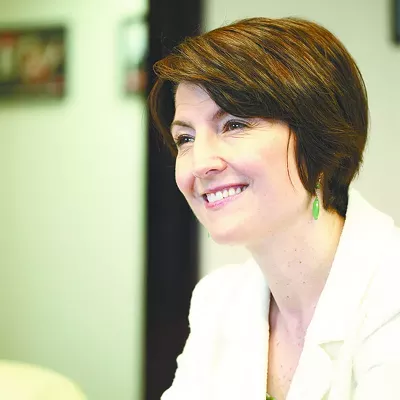
Over the years, plenty of local politicians have mused about the merits of expanding the number of Spokane County commissioners.
In 2007, Commissioner Bonnie Mager argued that five commissioners would provide more representation. In 2011, Commissioner Al French — after defeating Mager — noted the commissioners' workload was so large that he'd rarely get home before 8 or 9 pm. The cost to add two more commissioners, he said, was tiny enough to basically be a "rounding error."
When Mary Lou Johnson unsuccessfully ran against French last year, she brought up the idea unbidden in an interview with the Inlander.
"I think we need, really, to have that conversation about expanding the board of commissioners to five people," Johnson said.
As recently as February, Jim CastroLang, chairman of the Spokane County Democratic Central Committee, said he liked the idea of expanding the number of commissioners: "The way it is now, if two people kind of get on the same side about something, everything's decided before you get started," he said.
When Commissioner Shelly O'Quinn pitched the idea to community groups earlier this year, she says she was surprised by the level of bipartisan support.
But last week, when CastroLang stood up at a county hearing to testify about county Proposition 1, which would add two more commissioners, it was in firm opposition: "We don't want any of the county's time, resources, or money spent on this," CastroLang says. "It's not the right time."
Mager, French and Johnson have also fervently opposed the measure. It isn't just the big number that matters, they say. It's the fine print.
"We had three county commissioners when we first become a state in 1889 and had a county population of 55,000. Today we have 495,000," Commissioner Todd Mielke says. "Three commissioners simply can't do it well anymore. We live in a much more complex world."
Mielke and O'Quinn both take a look at their calendars and lament the fact that they can't be everywhere at once. Mielke tallies 116 county votes that French missed this year because he was attending other meetings. There are supposed to be three commissioners at the Spokane Regional Health District board meetings. Often, O'Quinn says, she's been the only commissioner there.
"People walk away feeling slighted when we can't get to their meeting," Mielke says. "It's like, 'Well, gee, I must not rate as high of a priority.'"
There's another issue: Three commissioners are often muzzled from communicating with each other. It has to do with open public meeting laws. On the Spokane City Council, one member can legally argue with another about the city budget, say, without calling a public meeting. The city council has seven members, and two aren't enough to change the outcome.
But with only three commissioners, two's a crowd. Many discussions about county business between two commissioners are legally required to take place during public meetings, usually advertised a week in advance.
These days, Johnson and other Democrats are clear that they don't just want to expand the number of commissioners: They want to change the way commissioners are elected.
"My question would be: Why add two commissioners if we don't get better county government?" Johnson says. "This does not give us better representation."
While Democrats like Mager and John Roskelley have served as county commissioners in the past, in recent years they've struggled to win county seats. In part, blame the odd way commissioner elections work: In the primary, only voters in the candidates' districts can vote. But in the general election, the entire county votes. In more liberal districts, like French's, a Democrat could do well in the primary and still get trounced in the countywide general.
Johnson and others argue that if we really want more diverse representation on the board of commissioners — instead of just two more Republicans — we need to elect commissioners by district. But to do that would mean switching the county to a "home rule charter," a complicated process that would also mean answering other tricky questions. Should we appoint our sheriff instead of electing him? Should voters be able to elect the county executive like they elect a mayor?
Support on the board of commissioners for electing commissioners by district, however, is minimal.
"I think it's a horrible model," O'Quinn says. She says it would create needless division on the board, with candidates fighting for what's best for their district, instead of what's best for the entire county.
Mielke and O'Quinn see partisanship driving the call for district elections. "The missive of that group," Mielke says, "is to find a way to elect more Democrats."
While adding commissioners wouldn't preclude the county from later launching a home rule charter process, local Democrats like Johnson worry that Proposition 1 would kill the momentum and motivation for such a big change.
"If we decide to take this bend in the road, we are stuck with the status quo but have two more commissioners," Johnson says.
Ironically, it's French who provides an implicit rebuttal to the idea that Republican commissioners will invariably vote in lockstep. During his first term, he and his fellow commissioners were generally unanimous on every decision. But that shifted after his re-election: These days, French's bon mots are often lobbed directly at the Republicans sitting beside him.
"Bickering among the members of the board over the last months makes your constituents wonder whose interest you have at heart," CastroLang told the board at last week's hearing.
French clashed intensely with the other commissioners over a proposed STA tax on the ballot last April. He investigated whether his fellow commissioners broke public meeting laws by communicating on their cell phones. (They hadn't.)
When a committee of local business leaders chose Mielke as the top pick for the Spokane County CEO position in June, O'Quinn made a motion to hire him for the job. But the motion died when French refused to offer a second.
Indeed, when French addressed Prop. 1 at the hearing, he let the accusations fly. Other arguments raised even more eyebrows. French says Mielke and O'Quinn "enjoy a personal relationship that goes beyond their responsibilities as county commissioners" and "when they are seen in public after hours or on weekends, it raises the question as to the nature of their conversations."
O'Quinn was not amused. "I'm sure that when accusations were made about him and his assistant, that he did not find that amusing or entertaining," she shot back.
French later said his comments were not intended to refer to anything sexual, but rather to call attention to the importance of the county's business being done in the public. And he has other concerns.
"Two of three commissioners can get in a room and draw the boundaries," French says. "Did I mention they're up for re-election?" He suggests the new districts drawn by O'Quinn and Mielke could look like the "broken leg of a cat" or a "twisted willow branch" as a way to avoid showdowns with potential opponents. Furthermore, he says, the commissioners could theoretically drag out the boundary-drawing process, stalling competitors from joining the race.
"Clearly, the two commissioners supporting this measure will benefit politically and financially," French wrote in a document ("Political Motivations for Five Commissioners") that he handed out to reporters.
O'Quinn and Mielke scoff at such accusations. "Our legal counsel says we absolutely had no conflict of interest," O'Quinn says. She already has outlined her priorities for drawing new boundaries: Each district should hew to existing geographic lines and arterials, she says, and include urban and rural areas.
French says his previous support for five commissioners eroded for several reasons. He got more efficient at doing his job and sent his assistant to cover some meetings he couldn't attend. Prioritization, he says, not workload, is the limiting factor for the three commissioners. After all, Mielke managed to complete the University of Washington's Executive MBA program while serving as commissioner. And French points out that, thanks to annexations and incorporations, the number of unincorporated citizens in the county has actually fallen in the past 25 years.
He says the budget situation doesn't leave much room for new commissioners: He points to county employees who haven't received a raise in five years, arguing that the county can't justify the $500,000 he estimates the proposition would cost. For that, he says, "I can put five more deputies on the road."
Mielke, by contrasts, pegs the cost of two more commissioners at $250,000, arguing that the three staff assistants should be pooled to work for all five commissioners. And compared with a general fund budget 600 times larger, Mielke suggests, that's, well, basically a rounding error.
Instead, he says Prop. 1 hinges on one basic question.
"The question is: Is three a sufficient number to run county business and represent all the different groups?" Mielke says. "To me, that's the debate." ♦
Looming over the five-commissioner question is another issue: Who will be the next CEO of Spokane County? When Al French refused to support Todd Mielke for the position in June, Mielke abandoned his pursuit of the role. "My chapter is done with the current makeup of the board," Mielke said in the Spokesman-Review.
That phrasing, naturally, has led critics to speculate that Mielke is pushing for two more commissioners so he could have another shot at the CEO position.
"It's an absolutely ridiculous accusation," Mielke says. "We are working to resolve the county CEO position sooner rather than later." By the time new commissioners are elected next year, Mielke says, the CEO will already be chosen.
"I am looking for someone who is going to be around for a while," Mielke says. The commissioners continue to fight over how to pick that CEO. Mielke and O'Quinn want to try to directly recruit candidates from Spokane, before having county staff recruit candidates outside the region.
French, however, wants to use an independent headhunting firm to find candidates this time. The previous attempt to have the county recruit candidates produced "horrible results," he says, with most of the 84 applicants not even meeting the minimum qualifications.
"I thought we could do better," French says. "We just used the wrong process." (DANIEL WALTERS)





















